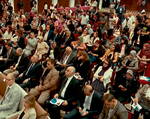Baghdad Regional Forum on the Advancement of Women
Published on Mon, 2019-10-07 12:13
For the first time since 2003, Baghdad hosted last August a regional conference on gender issues, co-organized by the government, civil society and UN agencies. The Forum discussed the role of the various institutional mechanisms for women operating in the Arab region and promoted the establishment of an independent national body for women's empowerment in Iraq. Reporting on the debate, the Iraqi Al-Amal association concludes that ‘effective institutional mechanisms are required to confront the challenges that hinder women's rights in the Arab region, especially during and after conflicts, and to confront the Israeli occupation, terrorism, extremism, religious radicalism, patriarchal mentality, tribal norms and corruption, and policies of exclusion and marginalization of qualified and active women in decision-making positions.’ The Baghdad Regional Forum for the Development of Institutional Mechanisms for the Advancement of Women in the Arab Region provided a platform for discussion and exchange of experiences among active players on the role of the various institutional mechanisms operating in the Arab region, focusing on their functions and powers, organizational structure, management of financial and human resources, and their achievements in improving the situations of women in all fields, as well as its joint work with civil society organizations in the formulation and implementation of policies and national plans for women. In-depth discussions pursued to mobilize joint national efforts to establish an independent national body for women's empowerment in Iraq. Discussions focused on the importance and effectiveness of institutional mechanisms to reduce the challenges that hinder the movements for of women's rights in the Arab region, especially during and after conflicts, and to confront the Israeli occupation, terrorism, extremism, religious radicalism, patriarchal mentality, tribal norms and corruption, and policies of exclusion and marginalization of qualified and active women in decision-making positions. The Final statement and recommendations of Baghdad Regional Forum for the Development of Institutional Mechanismsfor the Advancement of Women The Baghdad Regional Forum for the Development of Institutional Mechanisms for the Advancement of Women in the Arab Region, concluded its works in Baghdad 27th August 2019. The Forum was held under the patronage of the President of the Republic, in cooperation with the Secretariat of the Council of Ministers and the Supreme Council for Women Affairs in Kurdistan Region – Iraq, and organised by the Iraqi Women Network and Iraqi Al-Amal Association, with support from the UN Assistance Mission for Iraq (UNAMI), UN Women in Iraq, the Dutch Embassy and the International Women's Association for Peace and Freedom. The Forum was in preparations for the anniversary of the UN 1325 resolution + 20 and Beijing + 25. This is the first initiative after 2003 that Baghdad hosts a regional women's conference, in which representatives of governments and Civil Society from Iraq, Egypt, Palestine, Jordan, Lebanon, Tunisia, Yemen and Bahrain participated, as well as number of regional and international organizations. The three-day Forum provided a platform for discussion and exchange of experiences among active players on the role of the various institutional mechanisms operating in the Arab region, focusing on their functions and powers, organizational structure, management of financial and human resources, and their achievements in improving the situations of women in all fields, as well as its joint work with civil society organizations in the formulation and implementation of policies and national plans for women. In-depth discussions pursued to mobilize joint national efforts to establish an independent national body for women's empowerment in Iraq. Discussions focused on the importance and effectiveness of institutional mechanisms to reduce the challenges that hinder the movements for of women's rights in the Arab region, especially during and after conflicts, and to confront the Israeli occupation, terrorism, extremism, religious radicalism, patriarchal mentality, tribal norms and corruption, and policies of exclusion and marginalization of qualified and active women in decision-making positions. The participants emphasized the need for the independence of institutional mechanisms for women, ensuring competent human resources and sufficient budget for them, and strengthening their partnership with the civil society, women's research establishments, and media centers, to ensure that gender integration is influenced in all government policies, strategies and plans, and that government commitments are translated into concrete actions to achieve gender equality, with a view to developing them and enhancing their participation in changing stereotypes of women in general and towards active participation of women in security, peace, community cohesion and in the development process The participants also expressed the importance of women's solidarity across the Arab region in order to enhance more effectiveness of institutional mechanisms to achieve the Beijing Declaration and the Platform for Action, the provisions of CEDAW, Security Council Resolution 1325 and the Sustainable Development Goals. Participants made a special appeal to intensify national, regional and international efforts to free Aizidi women and children abducted by ISIS, ensure their safety and their return home, and called for the implementation of Security Council resolution 2379 of 2017 regarding accountability for ISIS crimes in Iraq. The participants called for the need to form a unified national mechanism for women under the title; the National Council for the Empowerment of Women, which should work according to an inclusive and comprehensive strategy for the advancement of the conditions of women in Iraq. In light of the inputs and discussions held in plenary and working groups, a number of recommendations were agreed, concerning the role of institutional mechanisms for the advancement of women: First Component: on the implementation of the agenda of Women, Security and Peace
Second Component: on the implementation of the Sustainable Development Goals
Third Component: on reducing violence against women
Fourth Component: on the political empowerment of women
Fifth Component: Visions on the establishment of the institutional mechanism for the advancement of women in Iraq
Download here the pdf version of the Final statement and recommendations of Baghdad Regional Forum for the Development of Institutional Mechanismsfor the Advancement of Women. See the documentary video here. Source: Iraqi Al-Amal Association. |
SUSCRIBE TO OUR NEWSLETTER



